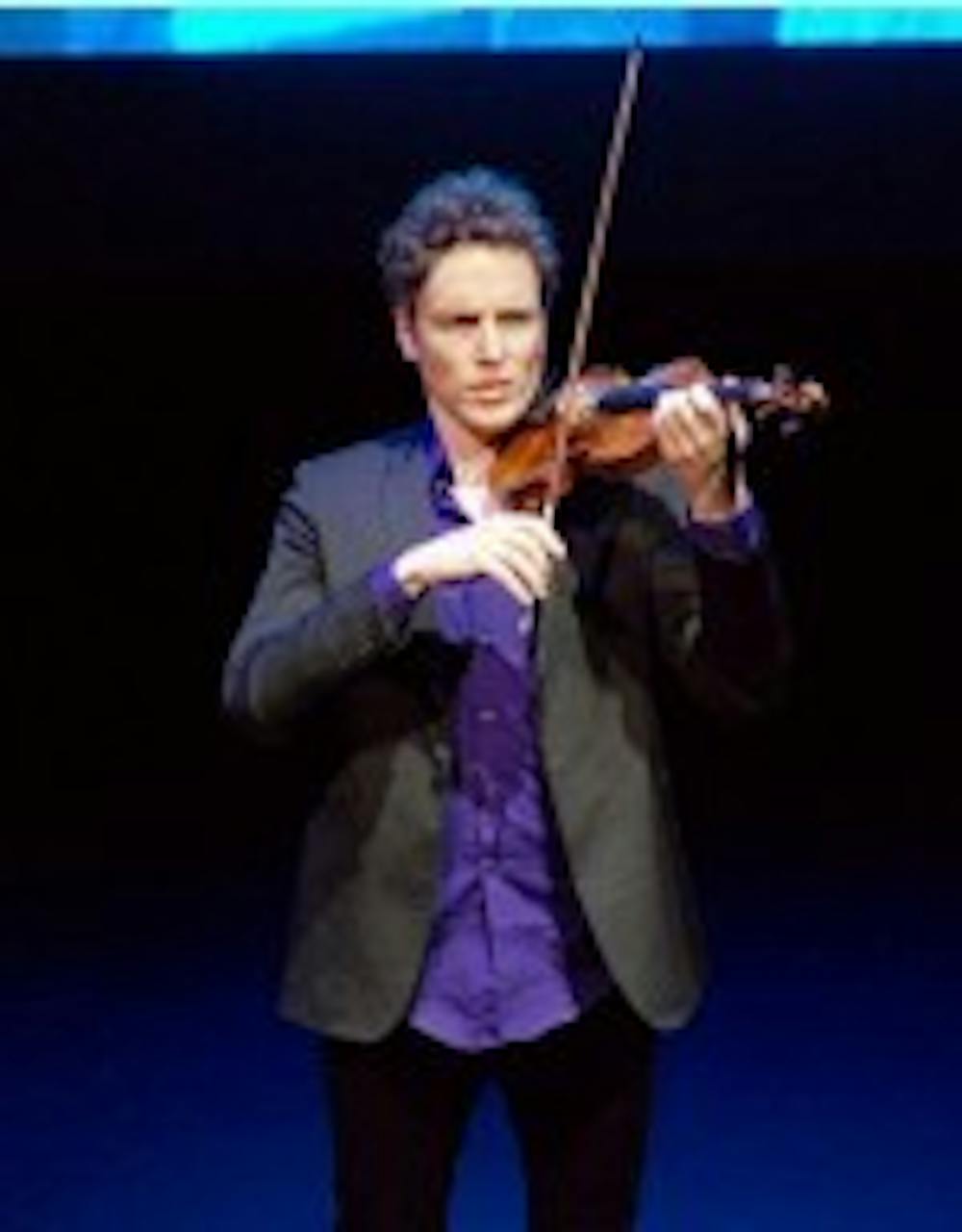Let the naysayers be damned - classical music still speaks to us today.
Last Friday, violinist Tim Fain delivered titillating imagery while also portraying beautiful classic music in his multi-media concert at UB's Center For the Arts. Fain's show delivered an evening that nourished the soul.
Fain's concert, Portals, 'a multi-media exploration of longing and connection in the digital age,' invited the audience to ponder our technological times and how we try to remain connected to one another, though we may be miles apart.
Fain draws on the works of many modern composers like Lev Zhurbin, Nico Muhly and long-time collaborator Philip Glass. While incorporating video images to accompany the music, which played behind him throughout the duration of the concert, Fain turned the traditional concert setting into a theatrical event.
While Fain was the only live performer on stage, he was accompanied by many. The synthesis of being completely alone while simultaneously being surrounded by others made the show unique.
Fain didn't worry that so many pre-recorded segments in his show would upset UB audience members. Fain holds that Portals is an intermingling between media and style.
"I thought the interaction between the performer and the TV screen was very interesting," said Lian Ye, a junior music theory major. "It was certainly nothing I've ever seen before."
Ye also thought the concept of technological longing was very pertinent to our times. "Instead of having real people around us, we just have our phones," Ye said.
The performance was in no way hindered by the digital images. In fact, Fain attests there are moments he doesn't feel alone on stage at all. For instance, piano player Nicholas Britiell, appeared in a pre-recorded video, but Fain played as if he were right on stage with him.
The show began with a video of actor Fred Child sitting in front of his Apple computer, recording himself reading from an old book of Leonard Cohen's poetry. This synthesis of old and new - contemporary technology, like the computer, and the more antique pieces, like the book of poetry - mix together to encapsulate the message of the show.
There was a great moment during "Honest Music" by Nico Muhly, where Fain appeared pre-recorded on screen with himself, live on stage.
The piece was so cinematic and choreographed that at times it was difficult to tell which violin was playing. Fain delivered the powerful moments on his own, like in the Philip Glass finale, with no special effects and just his violin playing.
"I thought the show was well done," said Steve Finley, a graduate violin performance student. "There was no emotion that wasn't touched."
Finley added that Fain's work with Glass was the best part of the show and he asserted it is hard to keep the audience's attention through concerts like this, but Fain did a great job incorporating a lot to keep the audience well entertained.
Finley didn't think the technological components deterred from the music.
"It was interesting how they incorporated the technology," Finley said. 'It gives us gateways into different interpretations of the music."
Fain own a very impressive resume and has been acclaimed by countless media outlets, such as The Boston Globe.
Fain debuted with the Baltimore Symphony Orchestra under conductor Marin Alsop at the Lincoln Center's Mozart Festival, and he has worked with the Oxford (UK) Symphonies and the Brooklyn Harmonics to name a few. He has built a strong rapport with Glass as a featured soloist in the Philip Glass Ensemble at Carnegie Hall. Most listeners will know Fain's work from the Black Swan soundtrack, of which he was a featured performer.
Now on his own, Fain travels the world delivering Portals, a conceptual concert incorporating different multimedia in the hopes of communicating, as Fain puts it, a "digital culture in a live performance."
He went on to say technology has not yet reached the point in which we can view a performance and feel a sense of seamlessness, but he asserts it is almost there. It is both "intriguing and unsettling," according to Fain.
For instance, the violin he used to perform with during the concert was made in 1717, though he performed pieces by contemporary composers. The juxtaposition between old and new makes the show what it is.
Philip Rehard, Slee Hall's concert hall manager, believes greatly Fain's work, seeing his Portals project as a means to making a statement - how we communicate differently in the age of Skype or Facetime, and how could this translate into live music.
"He just thinks about things differently than most people," Rehard said.
Rehard said there are always dangers when it comes to adding elements like computers to performances, but Rehard assures audiences they will walk away from the performance with a new perspective.
The UB Department of Music will next be hosting Michel Bouvard for its organ recital series on Feb. 17 at 5 p.m.
Email: arts@ubspectrum.com





